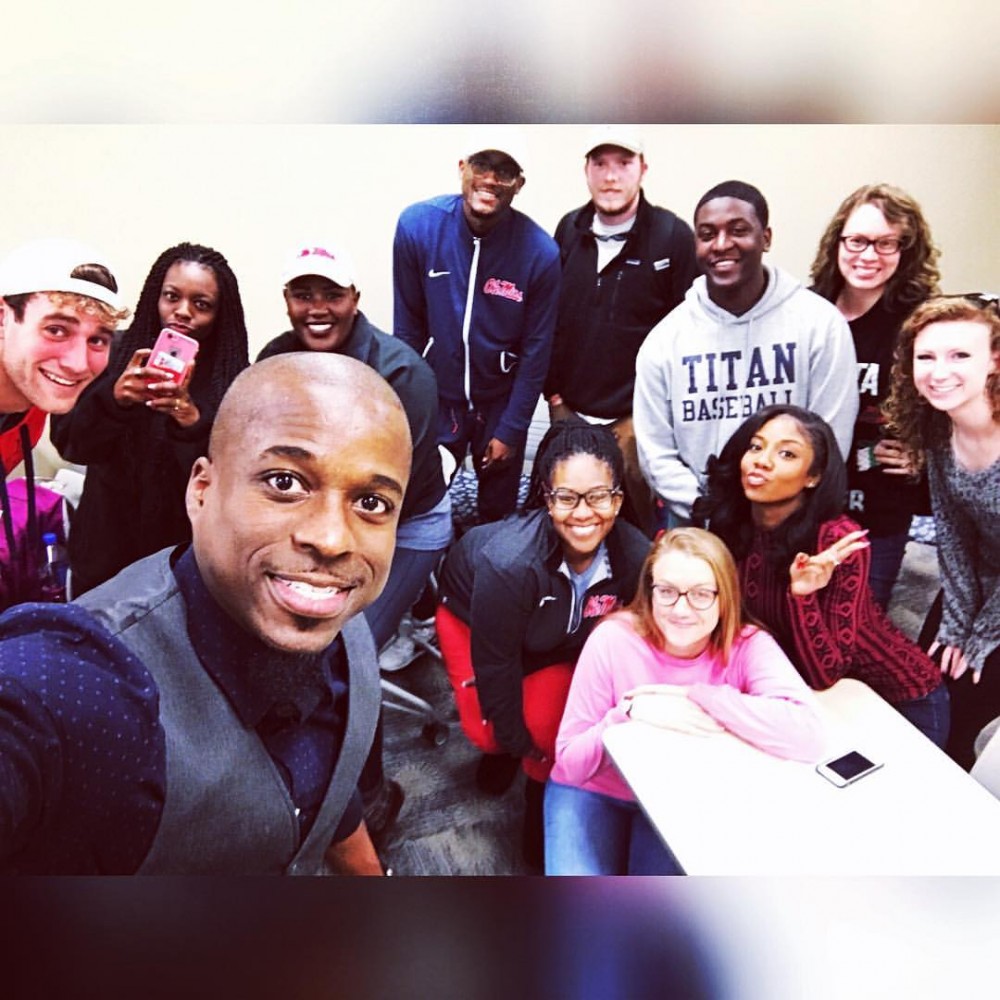Brian Foster’s SST 102: The Southern Protest Mixtape
SST 102: The Southern Protest Mixtape
Brian Foster, Assistant Professor of Sociology and Southern Studies, is teaching Honors Southern Studies 102 this semester. The interdisciplinary course is structured as an examination of southern protest culture, and organized like a mixtape. See excerpts from his syllabus below. This is part of an occasional series in which we share syllabi from Southern Studies courses.

Southern Studies 102 / Introduction to Southern Studies
The Southern Protest Mixtape
Spring 2017
By B. Brian Foster
mixtape
/`mikstāp/
noun
a recording on a cassette tape, CD, or digital medium consisting of blended or recombined tracks, or a series of tracks with smooth transitions.
OVERVIEW
 The American South is a riddle, a paradox—a region of tragedy and romance, violence and agape; a place of laughter and lynching, fried gizzards and sweet tea; home of Wallace and King, Hurston and K.R.I.T.; cathedral of southern belles, debutantes, and Bounce. This course interrogates the people and history of the South through a critical reading of the region’s protest culture(s)—Nina Simone’s “Mississippi Goddam,” Merle Haggard’s “I’m just a White Boy,” Beyonce’s “Formation,” and others. In the first section of the course, we will consider the conceptual foundations of “racism,” “race,” “regionalism,” and “protest.” We will then survey key events, figures, and epochs of southern history, from Slavery and Emancipation to Outkast’s audacious pronouncement—“the South Got Something to Say”—at the 1994 Source Awards. In the final section of the course, we will examine personal and alternative notions of protest. This course is highly interdisciplinary. We will consider perspectives from a variety of disciplines, from sociology to the humanities, and “texts,” from scholarly essays to popular culture.
The American South is a riddle, a paradox—a region of tragedy and romance, violence and agape; a place of laughter and lynching, fried gizzards and sweet tea; home of Wallace and King, Hurston and K.R.I.T.; cathedral of southern belles, debutantes, and Bounce. This course interrogates the people and history of the South through a critical reading of the region’s protest culture(s)—Nina Simone’s “Mississippi Goddam,” Merle Haggard’s “I’m just a White Boy,” Beyonce’s “Formation,” and others. In the first section of the course, we will consider the conceptual foundations of “racism,” “race,” “regionalism,” and “protest.” We will then survey key events, figures, and epochs of southern history, from Slavery and Emancipation to Outkast’s audacious pronouncement—“the South Got Something to Say”—at the 1994 Source Awards. In the final section of the course, we will examine personal and alternative notions of protest. This course is highly interdisciplinary. We will consider perspectives from a variety of disciplines, from sociology to the humanities, and “texts,” from scholarly essays to popular culture.
COURSE OBJECTIVES
This course is meant to help develop your: (1) capacity to engage issues related to racism, racial inequality, and social change; (2) awareness of the diverse people and complex histories of the U.S. South; (3) ability to critically assess and deconstruct the relationship between historical and contemporary social issues; and (4) understanding of interdisciplinary research methods. Beyond these, please take note of the general curricular goals put forth by the College of Liberal Arts.
Course Schedule
Tape 1 – Kreation
Kreation—itself an homage to Mississippi-based rapper, Big K.R.I.T.—samples from an assortment of both southern- and non-southern-based protest music. The goal is to motivated students to address conceptual questions such as, “what is racism?” and “what constitutes protest?”
Week 1
Tuesday (1/24) – Intro / “What’s your song?”
- Syllabus and Course Overview
Thursday (1/26) – Interlude / A Sociology Primer
- Mills, C. Wright. 1959. “The Promise of Sociology.” 3–24 in The Sociological Imagination
- Watch: “Sociological Imagination.” (6 min.)
Week 2
Tuesday (1/31) – “Southern State of Mind” (Darius Rucker) / Turning South
- Reed, John. 2013. “The Three Souths.” Pp. 11-21 In Minding the South.
- Reed, John. 1993. “The South: Where is it? What is it?” Pp. 5-28 in My Tears Spoiled my Aim.
Thursday (2/2) – “Power” (Kanye West) / What is Racism? What is Race?
- Feagin and Feagin. 2011. “Basic Concepts…” Pp. 4-27 in Racial and Ethnic Relations.
- Lukes, Steven. 2015. “Introduction.” Pp. 1-13 in Power: A Radical View.
Week 3
Tuesday (2/7) – “Fuck I Look Like” (Kai Davis) / Racialization, Regionalization, and Intersectionality
- Hull, Gloria, Patricia Scott, and Barbara Smith. “Introduction.” in But Some of us are Brave.
- Robinson, Zandria. 2014. “Introduction.” Pp. 11-23 in This Ain’t Chicago.
- Emba, Christine. 2015. “Intersectionality.” The Washington Post.
- Recommended (Watch): Crenshaw, Kimberlé. “The Urgency of Intersectionality.” (19 min.)
Thursday (2/9) – “Get up, Stand up.” (Bob Marley) / On Protest and Art
- Horn, Jessica. 2013. “Social Movements: Evolution…” Pp. 18-34 by BRIDGE.
- Jasper, James M. 2008. “The Art of Protest. Pp. 1-16 in The Art of Moral Protest.
- Recommended (Read): Newkirk II, Vann R. 2015. “What’s Going On…”
- Recommended (Watch): Baldwin, James. 1963. “The Artist’s Struggle for Integrity.”
Tape 2 – Epoch
Epoch samples songs and performances that illuminate some aspect of southern history. Many of the linkages are obvious—they are written or performed by southern artists, focus on an issue or symbol endemic to southern culture, or problematize conventional narratives about the South and southern history. Students will critically engage each track, while also using the music as entre to a broader conversation about what was happening in the South—socially, culturally, politically, intellectually—at the time the song was made.
Week 4
Tuesday (2/14) – “Roll Jordan Roll” (written by Charles Wesley) / The Antebellum South
- Jones, Leroi. 1999. “Slaves: Their Music.” Pp. 17-31 in Blues People.
- Palmer, Robert. 1982. “Beginnings.” Pp. 23-48 in Deep Blues.
- Watch: “Slave Songbook.” (17 min.)
Thursday (2/16) – “Dixie” (Daniel Emmett) / The Post-Emancipation South
- Wilson, Charles Regan. 2011. “The Invention of Southern Tradition.” in Flashes of a Southern Spirit.
- Watch: “Memory, Myth, and Memorial.” (9 min.)
Week 5
Tuesday (2/21) – “Strange Fruit” (Billie Holiday) / From the Cross to the Lynching Tree
- Wells-Barnett, Ida B. 1892. Southern Horrors: Lynch Law in All its Phases.
- Equal Justice Initiative. Lynching in America: Confronting the Legacy of Racial Terror.
- McFadden, Syreeta. 2016. “He Lived.” Buzzfeed.
Thursday (2/23) – “We Shall Overcome” (Guy Carawan) / Civil Rights, Pt. I
- Reed, T.V. 2005. “Singing Civil Rights – The Freedom Song Tradition.” Pp. 1-39 in The Art of Protest.
Week 6
Tuesday (2/28) – “Onward Christian Soldiers” (S. Baring-Gould) / Civil Rights, Pt. II
- Simon, Bryant. 1997. “Introduction.” in Race and Rumors of Race by Howard Odum.
- Southern Poverty Law Center. 2011. “Ku Klux Klan: A History of Racism and Violence.”
- Recommended (Read): Jacobs, Michael. 2010. “Co-Opting Christian Chorales: Songs of the Ku Klux Klan.” In American Music.
- Watch: “The Invisible Empire: the KKK and Hate in America” (27 min.)
Thursday (3/2) – Mississippi Goddam (Nina Simone) / Civil Rights Pt. III
- Loudermilk, A. 2013. “Nina Simone and the Civil Rights Movement.” JIWS.
- Pierpont, Claudia R. 2014. “A Raised Voice”” The New Yorker.
- Recommended (Read): Feldstein, Ruth. 2005. “I Don’t Trust You Anymore” in JAM
- Recommended (Watch): “Hard Talk with Nina Simone” BBC. (25 min.)
Week 7
Tuesday (3/7) – Interlude / Mid-Term
Thursday (3/9) – Flex (Party Boyz) / Flex Day
Week 8 – Spring Break / No Classes
Week 9
Tuesday (3/21) – “Give More Power to the People (The Chi-Lites) / Bloody Lowndes
- Jeffries, Hasan. 2009. “We Gonna Show Alabama Just How Bad We Are: The Birth of the Original Black Panther Party.” Pp. 143-178 in Bloody Lowndes.
- Recommended (Read): Hedin, Benjamin. 2015. “From Selma to Black Power.” The Atlantic.
- Recommended (Watch): “After Civil Rights…Black Power.” (50 min.)
Thursday (3/23) – “I’m just a White Boy” (Merle Haggard) / (Racial) Pride and Prejudice
- Hughes, Charles. 2015. “Pride and Prejudice…” Pp. 128-151 in Country Soul.
Week 10
Tuesday (3/28) – “Southernplayalisticadillacmuzik” (Outkast) / The South Raps
- Grem, Darren E. 2006. “The South Got Something to Say.” In Southern Cultures.
Week 11 – No Class
Tape 3 – Aesthetic
On the Aesthetic tape students begin/continue to grapple with “alternative” notions of protest, including their own approaches to resistance and social change.
Week 12
Tuesday (4/11) – “From Dixie with Love” (Ole Miss Band) / Old South New
- Wilson, Charles. “The Burden of Southern Culture.” Pp. 49-60 in Flashes of a Southern Spirit.
- Laymon, Kiese. 2015. “How They Do in Oxford.”
- Robinson, Zandria. 2014. “Riots and Rumors of Riots.” New South Negress.
- Recommended (Watch): “The KKK vs The Crips vs the Memphis City Council.” (34 min.)
Thursday (4/13) – “Explode” (Big Freedia) / LGBTQIA in the South
- Johnson, E. Patrick. 2008. “Introduction.” Pp. 1-23 in Sweet Tea Black Gay Men of the South.
- Watch: “Shake it Like a Salt Shaker: Bounce Music Defies Labels in New Orleans.” (9 min.)
Week 13
Tuesday (4/18) – “Borders” (Denice Frohman) / Latinx in the New South
- Bankston III, Carl. 2007. “New People in the New South” in Southern Cultures.
- Padilla, Yesenia. 2016. “What does ‘Latinx’ mean?”
- Scharrón-del Río, María and Alan Aja. 2016. “The Case for Latinx.” Everyday Feminism.
Thursday (4/20) – “Formation” (Beyoncé) / Reimagining “South”
- “How I Learned to Stop Worrying and Get in Formation.” SevenScribes.
- Robinson, Zandria. 2016. “We Slay, Part I.” New South Negress.
Week 14 – Class Presentations
Week 15
Tuesday (5/2) – “21 Questions” (50 cent feat. Nate Dogg) / Q&A with Brian
Thursday (5/4) – “Time Machine” (Big K.R.I.T.) / Class Review
